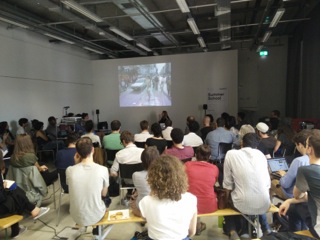
Aurélie Pittori: Could you briefly introduce the concept of the Manifesta Summer School and its development?
Heiko Schmid: The Summer School 2016 with its topic of Negotiating Space. Art and Dissent and its international orientation was initiated as a collaboration between Manifesta 11 and ZHdK’s Institute for Contemporary Art Research (IFCAR). The Summer School in Zurich explored challenges in contemporary art production by means of a research-led, practical approach focusing on art in the public realm. It was set up as an investigative think tank situation with students from all around the world reflecting on how contemporary art can produce, provoke and contribute to critical public debates. Since Manifesta already conducted a Summer School in Saint Petersburg, in which students from ZHdK and Christoph Schenker (the head of IFCAR) took part, the ambition to set up a Summer School in Zurich was present from the moment the team of M11 got together.
Aurélie Pittori: In a few words, why did the Manifesta biennial prove to be the perfect context to bring it to life?
Heiko Schmid: The Manifesta biennial with its critical ambition and satellite art projects intervening in the city was a perfect starting point to discuss art in the public realm.
Aurélie Pittori: Who were the participants in this event?
Heiko Schmid: We were able to invite a fantastic group of students from all over the world. There were basically two groups: one group of art students from art academies cooperating with ZHdK (Hong Kong, Hangzhou, Mexico City, Johannesburg, Alexandria, Palermo, Saint Petersburg and Delhi); the other group was formed via an open call and came from cities like Amsterdam, Krakow and Zurich. Hence the group was very diverse, which made the whole Summer School extraordinary.
Aurélie Pittori: This year the debate was centred on the notion of the public sphere and its interconnections with contemporary art – why this notion in particular?
Heiko Schmid: Manifesta partner IFCAR, which was responsible for the development of the Summer School, focuses on art in the public sphere. Since the concept of Manifesta 11 also links to the public realm and Manifesta is generally interested in socially engaged art, the topic represented a common interest.
Aurélie Pittori: One of the main issues being discussed was how contemporary art can produce, provoke and contribute to critical public debate and, moreover, how to intensify this influence. What would be your own suggestion?
Heiko Schmid: The question of the political dimension of art production is a huge discourse which has intensified in the last few years. My own suggestion in this context would be that the art world should not only focus on critical works of art but also critically question its own working conditions. Otherwise the art world, in my opinion, will lose its capabilities in softening sociocultural border areas and end up as a toy park for rich people.
Aurélie Pittori: The whole structure of the programme is composed of various kinds of working and discussing spaces like public lectures, forums, individual works, presentations or seminars. What is the difference between a presentation, a forum and a seminar? Which sort of guests did you intend to address?
Heiko Schmid: The public lectures did address a broader public by introducing the positions of the artists we invited to set up seminars for the Summer School. The seminars were meant to be open workshops in which internationally renowned artists interacted with the participants. The forum format was developed to enable the participants to discuss relevant topics together with experts from fields like political activism, philosophy, sociology or even computer sciences. So the different formats were aiming for different audiences with different priorities to engage with the participants.
Aurélie Pittori: There have been different speakers taking part in these lectures, seminars or presentations, including the artist Georgia Sagri, who is one of Manifesta 11’s newly commissioned artists. For what reason did you think of her in particular?
Heiko Schmid: Georgia Sagri is an artist who has worked in the public sphere for years. She is a critical thinker and she also analysed the concept of Manifesta 11 and its problems quite a lot. We wanted to offer her the possibility to start a discussion with our visitors and participants.
Aurélie Pittori: After having gone through this Summer School for two intense weeks, you surely remember one or more specific encounters or exchanges – could you share your favourite anecdotes with us?
Heiko Schmid: The Summer School was full of highlights. The group was extraordinarily energetic and managed to transform physical and social surroundings within moments. The ZHdK building was often transformed into some kind of stage for this vibrant group. Personally, I will always remember being told by one of our Indian participants that you cannot run away from an angry elephant on a straight path because elephants are quite fast. According to him, you have to run in a zig-zag to make them miss the turn (they are too heavy to follow you this way). I now understand this input to be a great statement on how to interact with big “power systems”.






